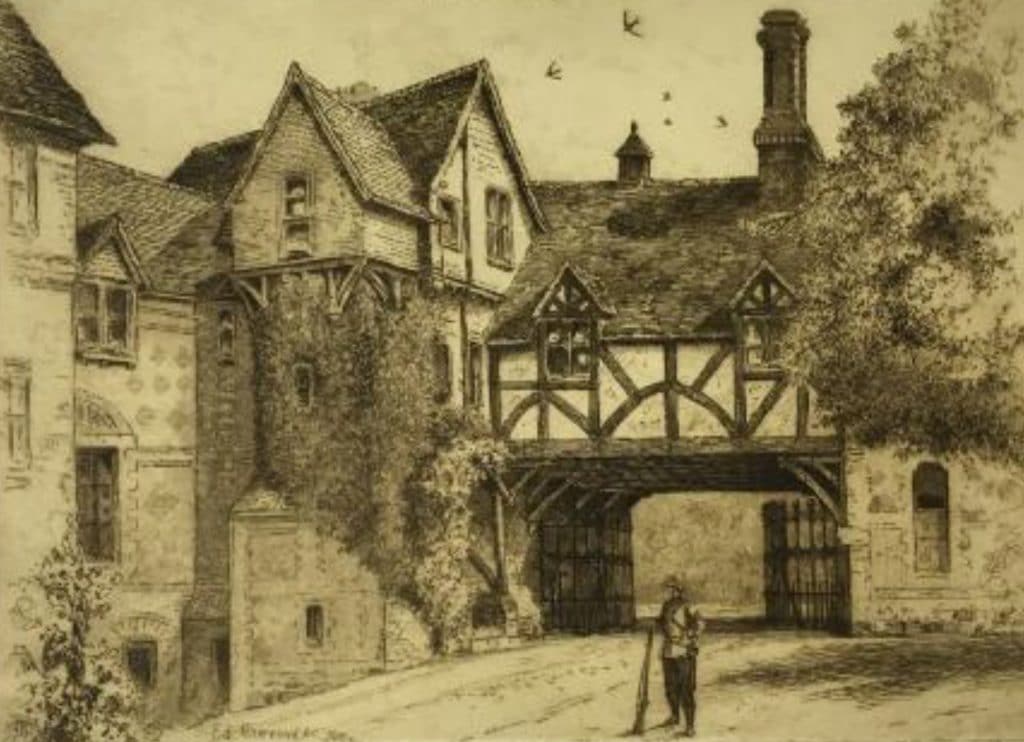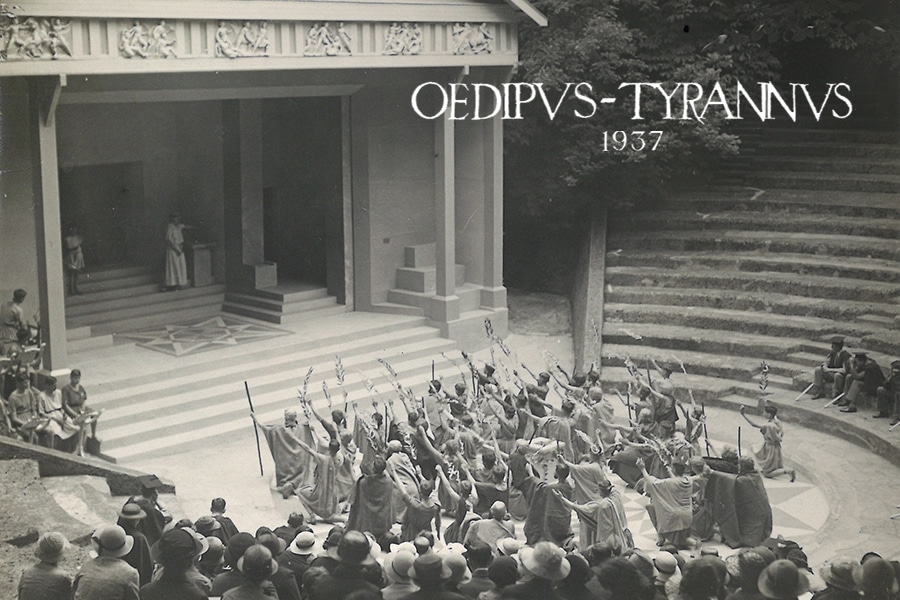At Bradfield, we are perhaps best known for our glorious open-air Greek theatre, affectionately known as ‘Greeker’, which is set in a disused chalk pit right at the heart of campus.
Greeker is at the centre of performing arts at Bradfield and is where the biggest event of the College year takes place, the Summer Play, with the Greek Play performed triennially.
There are surely few among those who come to see and hear a Greek Play at Bradfield who do not go away feeling better, broader and bigger-souled.
Dr Herbert Gray, Former Headmaster (1922)
The theatre plays an active role in College life and hosts a number of other events throughout the year from the tradition of Handshaking in the Michaelmas and Lent Terms and House Song on Goose Weekend, to Jazz on a Summer’s Evening, various music concerts and Commemoration at the end of the academic year.
THE BRADFIELD GREEK PLAY
After the rediscovery of the Great Theatre at Epidaurus in 1879, Frank Benson’s June 1880 Oxford production of the Agamemnon of Aeschylus inspired the Headmaster and Warden of Bradfield College, Dr Herbert Gray, to stage a production of Euripides’ Alcestis in February 1882 in the College’s Dining Hall. Described as “a plucky experiment” by The Spectator magazine, this first Bradfield Greek play was followed by a production of the Ajax of Sophocles at the University of Cambridge in the autumn of 1882. Thus began what became the regular triennial of Oxford-Bradfield-Cambridge Greek plays.
The Bradfield College History recounts how in 1888 the imaginative Warden “conceived the idea of converting [a chalk pit] into a Greek theatre, on the model of those existing in the best times of the Attic drama. With the aid of the boys, and afterwards with the help of professional workmen, he cut into the solid chalk ten tiers of seats, while he shaped the orchestra on the model of that at Epidaurus, in the Peloponnese — i.e. a complete circle or proper dancing place, such as existed when the Attic drama was little more than a series of hymns to Dionysus, interspersed with a monologue or dialogue between actors, from a temporary platform, introduced to give breathing time to the chorus… In June, 1890, Bradfield College, thus furnished, produced under unique conditions its first open-air Greek play, the Antigone of Sophocles. ‘For the first time,’ said the journals of that date, ‘since the downfall of the Greek stage a Greek drama has been produced under conditions exactly identical with those of ancient times… in an open-air theatre, the proportions and acoustic properties of which Pericles might have envied.’ ”
After the success of the Agamemnon of Aeschylus in 1892, the College put on Alcestis, followed by Antigone, followed by Agamemnon, at more or less regular intervals which became the familiar three-year cycle for the playwrights (though, after 1928, not for the plays) of Euripides-Sophocles-Aeschylus.
The only sad thing about the Bradfield play is that when watching one, one knows it will be three years before one can see anything so good anywhere in England.
1928: John Masefield, Poet Laureate 1930-1967
Over the years, the fame of the Bradfield Greek Play spread far and wide. Prime Ministers, poets, generals, archbishops, writers and actors, have all supported this unique event. T.S. Eliot, Sybil Thorndyke, Agatha Christie, Lord Asquith, Field Marshal Lord Montgomery, Sir Peter Hall and Enoch Powell were all faithful pilgrims.
Despite regular maintenance, modern safety and access requirements led to the closure of the theatre in 2009.
RESTORATION
In May 2011 a campaign was launched to restore Greeker to its former glory and the restored Bradfield Greek Theatre re-opened in May 2014.
To celebrate the re-opening of the theatre, Bradfield held a Gala Performance on 10 May 2014. The event was hosted by Old Bradfieldians Mark Nicholas (Television Presenter), Claudia Harrison (Actor) and Jonny Saunders (Radio Presenter and Housemaster), and included performances from pupils past, and present.
Performing in the Greek Theatre led me to try the profession for real. The experience of working in that space has stayed with me and always will.
Claudia Harrison, Actor and Old Bradfieldian
The newly restored theatre then hosted its first Greek play, Antigone, in June 2014, a timely call back to the first play ever performed in this wonderful space. The Persians of Aeschylus followed in 2017 and Euripides’ Alcestis in 2019. After a COVID-driven hiatus delayed the production, the College came back in turn to Sophocles and, as in 1937, 1979 and 1997, Oedipus the King.
After considerable discussion with staff and pupils, it was decided that 2023 production would, for the first time, be a hybrid of both Classical Greek and modern English. This was in no way an attempt to reduce the challenge for pupils taking part, but an attempt to make the play more accessible to a wider audience and to help nurture a love of classical theatre in them, an approach that has also been taken by Oxford University with their Greek play. The 2023 production of Oedipus The King proved to be an exciting and dynamic production that felt faithful to the Bradfield tradition but also began to forge a new tradition in which Greek Drama continues to play a central role in the school calendar and to be enjoyed by future generations of pupils and parents.




